Iran Protests To Britain Over London Human Rights Tribunal
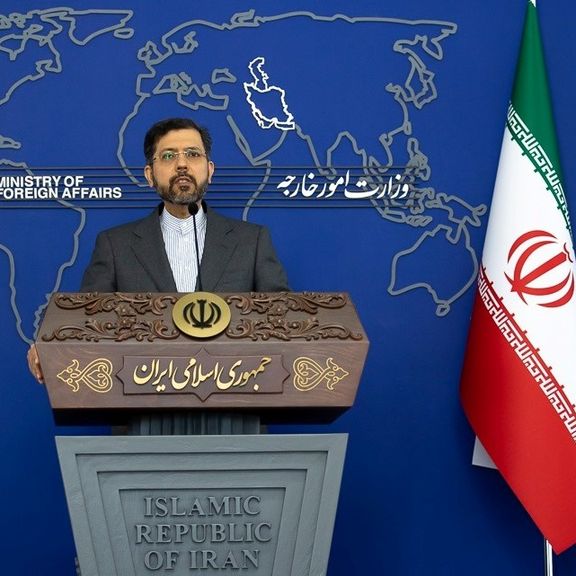
Iran has criticized the United Kingdom over the ‘Iran Atrocities Tribunal,’ which held a second round of sessions in London last week.

Iran has criticized the United Kingdom over the ‘Iran Atrocities Tribunal,’ which held a second round of sessions in London last week.
At his press conference Monday, Iranian Foreign Ministry spokesman Saeed Khatibzadeh said Tehran had expressed “serious protests” to the UK over London acting as a “hub” for foreign media hostile to Iran.
The spokesman said the tribunal, which is meeting with selected media, was a “theatrical show.”
The tribunal − also known as Aban Tribunal after the Iranian calendar month of Aban of 2019 protests over fuel increases −sat from Friday to Sunday. It has ‘indicted’ 160 Iranian officials with “crimes against humanity.”
But while the tribunals’ ‘verdicts’ are symbolic, some organizers have said a file has been sent to the International Criminal Court and have called for international sanctions against named individuals.
When in London to meet British officials in November, deputy Iranian foreign minister Ali Bagheri-Kani said the tribunal’s activities in London could jeopardize progress in Vienna, where he leads Iranian negotiators meeting world powers, including the UK, trying to revive the 2015 international agreement limiting Tehran’s nuclear program.
During the November 2019 protests, following a fuel price increase designed to ease a fiscal deficit, Amnesty International documented the killing by security forces of over 300 people.

The ‘honor-killing’ of a 17-year-old woman, and mother of 3-year-old, in southern Iran on Saturday has sparked debate among Iranians over laws regarding women.
Iranian authorities shut down a news agency on Sunday after it published a video of the husband parading in the street with his wife’s severed head.
Rokna agency had reported that the man with the help of his brother had killed the woman in what it termed an ‘honor killing.’
Abbas Hosseini-Pouya, prosecutor general of Ahvaz, provincial capital of Khuzestan, told the press that two alleged killers had been arrested. Rokna had reported that Mona Heydari had been killed in Ahvaz by her brother-in-law and husband, allegedly after her father helped the husband bring her back from Turkey where she had fled, purportedly from her husband's violence.
Honor-killings are rampant in some regions of the country, such as Khuzestan and Kermanshah where tribal structures are still very strong.
Heydari had been married to a paternal cousin at the age of 12 and had a child at 14. Hosseini-Pouya said that she had sent photos of herself to her husband from Turkey that had fueled the husband's “negative emotions."
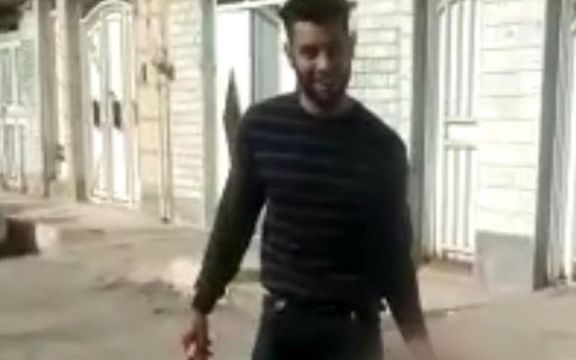
The prosecutor general said the legal authorities would act both over the killing and the display of the severed head, and that action would also be taken against anyone who had filmed the incident, possibly to post on social media.
Hashtags such as the victim's name, child marriage, ‘honor-killing,’ Ahvaz, and woman were among the top ten Persian-language Twitter hashtags Monday. Telegram and Instagram were dominated by discussions of the incident.
"He has ruled, before a trial, that the victim whose head was paraded in the street was to blame for her own killing because she hurt her husband's emotions," one tweet read, finding fault with the prosecutor and linking the killing to the constitutional watchdog Guardian Council refusing to endorse legislation banning child marriage.
Hardline media, except the IRGC-linked Javan newspaper, ignored the incident. in an article entitled "Psychological Damage [to Society] With Violent Images Not Media's Job", Javan defended the shutting down of Rokna.
"This is not the first time that to attract more readers privately-owned media publish news, photos and videos considered as immoral by the society and directly threaten the emotional health of the society," Javan wrote, without mentioning honor killing or laws that critics say encourage such crimes.
The reformist journalist Abbas Abdi preferred to take issue with conservative papers that didn’t report the killing. "Hardliners who must condemn the killing of the Ahvazi girl are silent about it because they traditionally believe such behavior can prevent sexually related transgressions, so their silence means relative condonement of this horrible incident," Abdi wrote in Etemad newspaper, which ran several articles on the issue.
Etemad did condemn Rokna for publishing the images. Like many media, it used the term “honor killing” in a headline, while attacking he conservative-dominated parliament for introducing laws encouraging women to have more children rather than, the paper said, introducing more laws to protect them from violence.
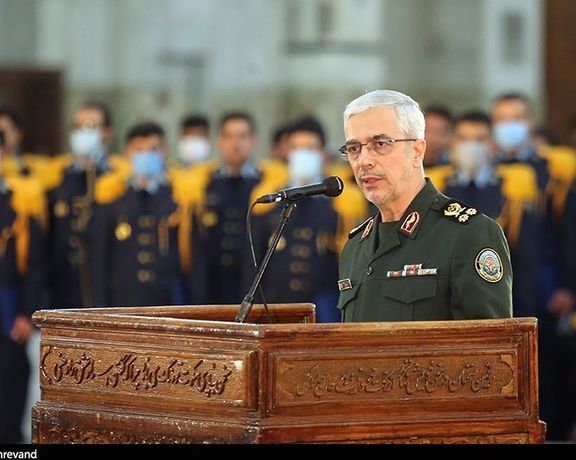
The top military commander of the Islamic Republic says Iran will become one of the world's biggest arms exporters once sanctions are lifted.
Chief of General Staff of the Iranian Armed Forces Major General Mohammad Bagheri made the remarks during a ceremony at the mausoleum of Ruhollah Khomeini, the founder of the Islamic Republic, on Monday.
Bagheri boasted about the power of Islamic Republic’s precision-guided missiles and drones with multiple applications.
“We don’t need anybody. We determine our strategy, policy and doctrine”, he said, adding that except for “three main superpowers in the world” no country can do this, “not even the Europeans”.
During recent days, while the government has been celebrating the revolution's anniversary, many officials have made such remarks about Iran’s military power.
IRGC Commander Hossein Salami said on Friday that “no world power is capable of confronting the Iranian nation” and the editor of a hardliner daily operating under the aegis of the supreme leader says Iran's precision missiles can target any spot in Europe.
Members of the US House of Representatives asked President Joe Biden last week to focus on Iran’s ballistic-missile capabilities, expressing concerns about attempts to develop an intercontinental ballistic missile which could “potentially put US allies in Europe as well as the US homeland in range.”
Lawmakers demanded written answers in 30 days to questions about the capability of CENTCOM defense systems against the missile threat and the administration’s measures to enforce sanctions on sectors of Iran’s economy that support the ballistic missile program.
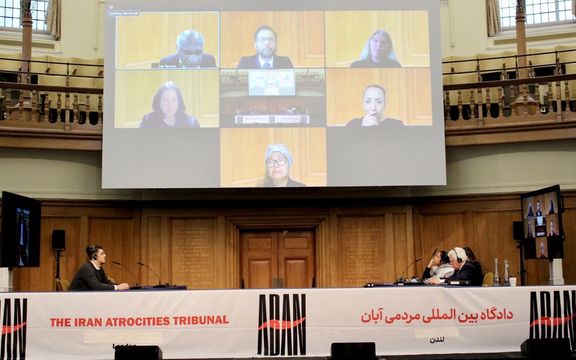
The Iran Atrocities Tribunal investigating gross rights violations has charged 160 officials of the Islamic Republic with "committing crimes against humanity".
The tribunal was established in 2020 to investigate the killing of hundreds of protesters in nationwide protests in Iran in November 2019. Concluding its second round of hearings in London on Sunday released a list of the accused officials, which includes Supreme Leader Ali Khamenei.
Heads of the executive and judiciary branches of the government, ministers, commanders from the Revolutionary Guards and police as well as officials from provincial governors’ offices are named in the list.
The tribunal heard testimonies from 219 witnesses and examined evidence from 440 people related to crimes against humanity, extrajudicial killings and executions, torture, rape of prisoners, and harassment of the families of the victims.
Although the verdicts of the Tribunal are symbolic, the panel of the tribunal called on all those who have more documents and evidence about crimes by officials to submit them.
Earlier in the day, a senior IRGC member, identified as witness 600, said that Khamenei's office ordered the military and paramilitary forces to do whatever is necessary to end the chaos.
Reuters had reported in December 2019 that the order to end protests at any cost had come from Khamenei who was deeply concerned about preserving the clerical regime.
The IRGC officer claimed that 427 people were killed in Khuzestan province and 420 in Tehran alone during the crackdown, adding that about 8,000 people were also arrested in the capital.
Earlier estimates ranged from 300 to 1,500 civilians killed nationwide. The new figure offered by the witness would mean that the overall death toll was much higher.
Organizers of the tribunal say an extensive systematic state policy was behind suppressing protesters with help from Iran’s proxy militia forces from the regional countries.
One of the witnesses said on Saturday that as a member of Iran’s ‘Imam Ali’ anti-riot brigades he had seen the deployment of “violent criminals” as well as members of the Iraqi Popular Mobilization Forces, and the Afghan Fatimiyoun militia, organized and commanded by the Revolutionary Guard (IRGC).
He added that Imam Ali brigades had set gas stations ablaze to blame the fires on the protesters and to justify suppression and had been authorized to shoot protesters in the torso and head to end the unrest.
The tribunal − also known as Aban Tribunal after the Iranian calendar month of Aban when the atrocities took place− was established by the Oslo-based Iran Human Rights (IHR), and the international anti-capital punishment organization Ensemble Contre la Peine de Mort (Together Against the Death Penalty).
The protests were the bloodiest in Iran’s history with security forces opening fire with military weapons on demonstrators in many cities. Thousands were arrested and jailed without due process of law and there were numerous reports of torture in prison.

An Iranian official has said that the government doesn’t have information about the exact value of its assets, which hinders efforts for their capitalization.
In an interview with Khabar Online website in Tehran published on Sunday, the head of the Iranian Privatization Organization, Hossein Ghorbanzadeh, said that the government seeks to solve its budget deficit and liquidity issues through privatization of state properties and companies but cannot do so because it does not exactly know their value.
US sanctions since 2018 have drastically cut government revenues from oil exports and trade, leaving a higher-than 50 percent budget deficit.
He said the government has a portfolio of assets that includes physical assets such as real estate and financial assets such as shares of state-owned enterprises.
Ghorbanzadeh also proposed the establishment of an emergency taskforces to investigate the assets, adding that the government has opened a website to gather data from officials and entities.
He said the current estimates of the value of the assets are in a wide range from $260 to $670 billion in today’s exchange rates.
Earlier in December, the head of a government chamber of commerce, Gholam-Hossein Shafei said that the country had zero economic growth in the past decade, adding that the private sector in Iran has been dealt a bad hand by politically well-connected elites who took advantage of privatization to enrich themselves.
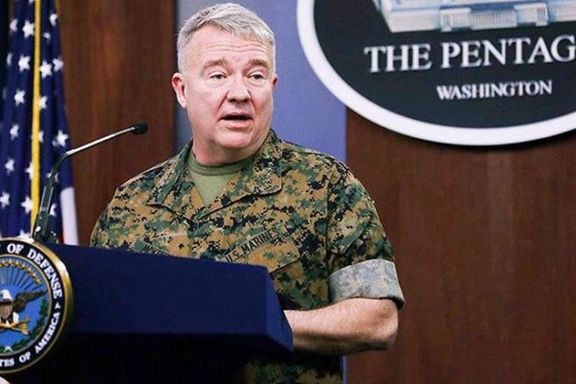
US Middle East Commander General Frank McKenzie arrived in the United Arab Emirates Sunday for talks to bolster the Gulf state's defenses after missile attacks by Houthi fighters in Yemen.
In recent weeks, the Iran-backed Houthis have waged an unprecedented string of largely failed missiles strikes on UAE targets that have triggered Emirati and US air defenses and seen American troops briefly taking shelter.
McKenzie, who is head of Central Command, said he moved up his planned visit in response to the Houthi attacks, hoping to underscore the US commitment to UAE’s defense.
"I think it's a very worrisome time for UAE. They're looking for support. We're here to help them to provide that support," McKenzie told reporters.
The Pentagon has announced a US deployment of advanced F-22 fighter jets and a guided missile destroyer, the USS Cole, to partner with the UAE navy ahead of a port call in Abu Dhabi.
McKenzie said the F-22s would provide the UAE with "one of the best look-down radars in the world," capable of identifying targets including land attack cruise missiles and drones.
Washington accuses Tehran of supplying high-end weaponry to the Houthis.
"Medium range ballistic missiles that were fired from Yemen and entered UAE were not invented, built, designed in Yemen," McKenzie said. "All that happened somewhere else. So, I think we certainly see the Iranian connection to this."
Reporting by Reuters